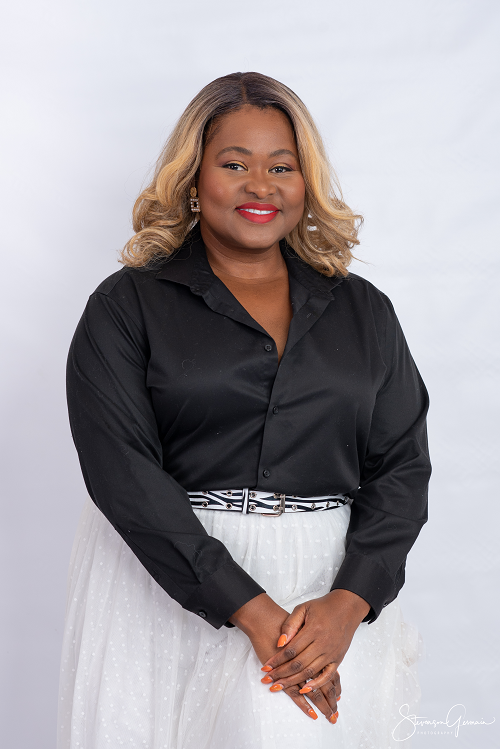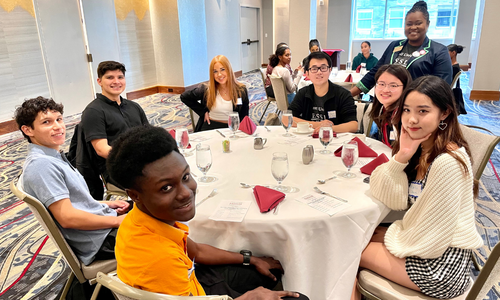Dannemart Pierre joins Cornell to meet needs and empower students
Dannemart Pierre joined Cornell University in July 2022 as the Peggy J. Koenig ’78 Associate Dean of Students for Student Empowerment and Director of First-Generation & Low-Income (FGLI) Student Support.
“FGLI students are trailblazers! They bravely chart territory unfamiliar to their families and communities of care, oftentimes without the necessary emotional or social support from those communities. This isn’t just about being a student. FGLI students are tasked with being the leaders, educators, interpreters, financial supporters, and advocates for themselves and their families. It is all encompassing,” Dannemart says.
Although providing financial resources is a large function of her office, Dannemart believes empowering FGLI students goes well beyond meeting these tangible needs, it also includes education and celebration.
Through education, “the Cornell community at large can support FGLI students by understanding that there is an emotional and social weight to being a trailblazer,” Dannemart says. “What does it look like? What are the unspoken struggles? How are they manifested in the classroom or residence halls?” It is vital, too, that “FGLI students see that their experience is not unique; it is shared by FGLI students across the nation.” To be isolated can be detrimental.
“Celebration is equally critical because FGLI students are overcomers, achievers, dreamers, fighters! They are determined to thrive and make space for themselves and those who follow,” Dannemart continues. “Their accomplishments are worthy of celebration. Taking time to honor their journey is a critical part of empowering students.”
In her role as the Associate Dean of Students for Student Empowerment and Director of First-Generation & Low-Income Student Support, Dannemart seeks to meet needs and empower students via supportive resources and programs, many of which are run in partnership with offices across campus. Support for undocumented and DACA students comes in the form of a mentorship program, scholarships, and regular community dinners that promote connection. Assistance is also available from staff advocates through the Cornell Committee to Support Undocumented Students and Cornell Law’s Immigration Clinic. Through the Access Fund, eligible students can receive up to $500 in financial support annually for transformative experiences and basic needs. The FGLI office and Cornell Dining partner with Swipe Out Hunger which allows students across campus to donate bonus meals from their plans to the program which doles out the donated meals to food insecure students. Building on the current work of her office and through conversions with students, this semester, the FGLI office is launching a Basic Needs Workshop Series, an initiative focused on educating the community on topics such as the Supplemental Nutrition Assistance Program (SNAP), the Cornell Food Pantry, and housing to name a few.
Another transformational program supported by this office is the Kessler Presidential Scholars program. Now in its fourth year at Cornell, the program offers mentorship, financial assistance, connection, and workshops to cohorts of first-generation students at Cornell. First-Generation Celebration Day is on November 8, and this year, says Dannemart, “we’ve partnered with multiple schools and programs to host a weeklong celebration, November 7-11, of our first-generation population. This style of campus-wide programming offers an opportunity for community education and FGLI student celebration. The office runs many workshops, hosts panel conversations, and events throughout the academic year.
Beginning her fourth month on the job, a former FGLI student herself, Dannemart is inspired, encouraged, and excited by the opportunity “to merge [her] lived experience as a FGLI student with growing industry research to create lasting support for Cornell students.” She states, “When I was in undergrad, we didn’t have the verbiage for first-generation. Or if it existed, it wasn’t broadly discussed, and it most certainly wasn’t a field of study. That was only 15 years ago. Now we have so much interest and research being done in order to formalize best practices for FGLI student success. I am excited about that!”
Students in need of assistance should visit the First-Generation & Low-Income office website for more details and contact information. “Being a trailblazer feels like a lonely journey, but you are not alone,” says Dannemart.


